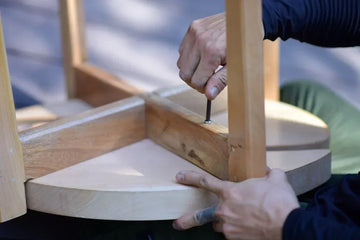In the world of interior design, nothing exudes elegance and sophistication quite like custom, handmade furniture. Our journey begins in America, where craftsmanship and creativity culminate in the creation of bespoke furniture pieces that become the centerpiece of any home. As more individuals seek originality and personalization, the demand for custom-made furniture continues to climb, reshaping the furniture landscape one handcrafted piece at a time.
The Significance of Handmade Furniture in America
Handmade furniture in America represents more than just household items; it is an amalgamation of history, art, and personal expression. These pieces stand as a testament to America's rich woodworking heritage, where artisans have passed down their skills from generation to generation, preserving techniques while welcoming innovation. In a market saturated with mass-produced items, custom furniture embodies exclusivity and a deeply personal connection between the creator and the owner.
The Art and Craft of American Furniture Making
American furniture making is steeped in tradition, with each piece reflecting the artisan's skill, creativity, and dedication. Craftsmanship in furniture making involves mastering various techniques, from intricate wood carving to seamless finishes. Workshops across the country, such as Isabella, focus on these time-honored practices, creating spectacular pieces that resonate with beauty and function.
Understanding the Customization Process
The customization process allows individuals to bring their visions to life, resulting in furniture pieces that match their specific needs and taste. This process involves selecting materials, finishes, textures, and designs that reflect the customer's personality and harmonize with their living space. Customized options, such as the offerings from HauteHouse Home, cater to discerning tastes and preference for uniqueness and style.
Economic Impact of the Handmade Furniture Industry
The handmade furniture industry provides a significant boost to the American economy by supporting local artisans, small businesses, and sustainable practices. According to industry studies, custom furniture sales contribute a sizable percentage to the furniture market. This industry enables artisans to earn fair wages, thereby enriching communities and sustaining the demand for high-quality craftsmanship.
The Role of Sustainability in Custom Furniture
Sustainability lies at the heart of handmade furniture, with many artisans adopting eco-friendly practices such as using reclaimed wood and reducing waste. The shift towards sustainable furniture reflects a buyer's desire to make environmentally conscious choices. According to a report by the American Home Furnishings Alliance, there is a growing preference among consumers for sustainable options, positioning custom furniture as a leader in eco-friendly home design.
The Advantages of Investing in Custom Furniture
Investing in custom furniture offers a plethora of benefits, including superior quality, durability, and exclusivity. Unlike mass-produced items, handmade furniture showcases meticulous attention to detail, often lasting for generations. Additionally, these pieces add a level of sophistication to any space, making them a worthwhile investment for those who value quality and craftsmanship.
Handcrafted Elegance: The Epitome of Luxury
Luxury often goes beyond the material; it encompasses the experience and the story behind an item. Handmade furniture transforms ordinary lives into extraordinary experiences. Each piece tells a story—its journey from a sketch by a talented designer to a completed masterpiece. The epitome of luxury, these pieces create a personalized narrative, fostering deeper connections within one's living space.
Challenges Faced by the Handmade Furniture Industry
Despite its numerous advantages, the handmade furniture industry faces challenges related to scalability and consumer awareness. Artisans often operate with limited resources, which may hinder production capabilities. Additionally, the allure of mass-produced, cheaper alternatives can sometimes overshadow the value of custom furniture. However, increasing consumer education on the benefits of sustainable and high-quality products can help overcome these hurdles.
The Future of Custom Furniture in America
The future of custom furniture is promising, driven by the rising demand for personalization and sustainability. With technological advancements, manufacturers are now equipped to offer more sophisticated and tailored options, appealing to even broader audiences. As the market for custom and bespoke pieces grows, the handmade furniture industry is set to redefine standards of luxury and design.
Conclusion: The Symbolism of Custom Furniture
Handmade custom furniture stands as a symbol of personal expression, artistic heritage, and sustainable luxury. As we embrace these unique pieces, we honor the craftsmanship and dedication of American artisans who carefully fashion each chair, table, or bed into a work of art. Investing in such furniture is not merely about acquiring an item; it's about enriching one's living experience with unparalleled elegance and connection.
Key Takeaways
The handmade furniture industry in America represents the epitome of luxury, characterized by exquisite craftsmanship and personal expression. Its significance stretches beyond aesthetics, fueling economic growth and sustainability. As we look to the future, custom furniture continues to transform how we experience our homes, providing lasting elegance and sophistication.
FREQUENTLY ASKED QUESTIONS
Handmade furniture is celebrated for its craftsmanship and uniqueness, often crafted by skilled artisans who put immense attention into each detail. This results in furniture pieces showcasing superior quality, durability, and intricate artistry that mass-produced items cannot replicate. The process allows for customization, making each piece distinct and personal, contributing to its luxury appeal.
Investing in custom furniture supports local artisans and craftspeople, often boosting small businesses and the local economy. According to industry analysis, the handmade furniture market contributes significantly to economic growth by creating jobs and maintaining sustainable practices. It promotes fair wages and quality labor conditions, reflecting positively on the wider economic landscape.
Sustainability is vital in the custom furniture industry as it reflects environmentally responsible practices. Many artisans utilize reclaimed wood and eco-friendly materials, reducing waste and the carbon footprint associated with manufacturing. By championing sustainable processes, the industry adapts to the consumer's increased desire for responsible and ethical consumption.
Handmade furniture offers a myriad of customization options, including choosing the type of wood, fabric, finish, and design elements that align with personal tastes. These options allow customers to direct the furniture's form and function, ensuring that each piece fits seamlessly into a home's aesthetic while reflecting personal style. Customization adds significant value to the furniture, cementing its status as a prized possession.
Despite its luxurious appeal, the handmade furniture industry faces challenges such as scalability constraints, higher production costs, and the need to educate consumers about its unique value proposition. The popularity of cheaper, fast-production alternatives often poses competition. However, increasing awareness and appreciation for quality craftsmanship can help surmount these challenges, ensuring the longevity and growth of the industry.






